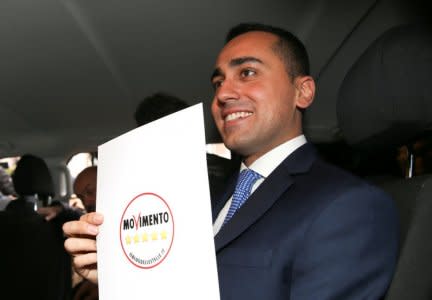Italy's 5-Star presents election program with no euro referendum

Thomson Reuters
By Gavin Jones
ROME (Reuters) - The anti-establishment 5-Star Movement, leading opinion polls ahead of a March 4 election, has presented a 20-point program which makes no mention of a referendum on Italy's membership of the euro zone.
5-Star has steadily scaled back its commitment to the referendum that used to be one of its main policies. The plan frightened financial markets which saw it as a threat to the whole single currency project.
5-Star's moderate new leader, Luigi Di Maio, who was elected in September, presented the program at a party gathering in Pescara on the Adriatic coast, saying it would be the basis for negotiations with other parties after the election.
"The political forces will have to tell us why they don't want to converge around this program, and we will ask them on the evening of March 4," 31-year-old Di Maio told reporters.
5-Star leads opinion polls with some 28 percent of the vote, about 5 points ahead of the ruling Democratic Party.
However a center-right alliance of smaller parties, led by Silvio Berlusconi's Forza Italia (Go Italy!) totals about 37 percent and is seen winning most parliamentary seats, though not enough for a working majority.
As well as dropping the euro referendum, 5-Star has also shifted away from a previous refusal to consider governing with other parties.
Di Maio says that if the center-right bloc is unable to form a government and 5-Star is the largest party, President Sergio Mattarella must give him a mandate to try to win cross-party support for his program.
5-Star, founded in 2009 by comedian Beppe Grillo, started out as a protest movement that appealed to voters sickened by corruption and cronyism among Italy's political and business elite.
TAX CUTS
Since his election Di Maio has tried to give it a less revolutionary image to win over moderate voters, stressing the party's pro-business agenda as well as the fight against graft.
Top of 5-Star's 20-point plan is a promise to cut red-tape by abolishing 400 "useless" laws. It also promises a "drastic" reduction in business taxes as well as its flagship policy to fight poverty by offering an income of up to 780 euros per month for all those willing to look for work.
Di Maio also presented some of 5-Star's high-profile candidates at the election, including prominent television journalists and the head of a consumer rights group, countering critics' charge that the party lacks experience and competence.
The candidates also included a coastguard officer, Gregorio De Falco, who became a national hero in 2012 when the Costa Concordia cruise ship capsized, killing 32 people.
De Falco, who will run for a seat in the Senate, famously told the fleeing captain of the ship to "Get back on board, damn it!" during a furious telephone exchange broadcast to millions of Italians on television.
The election program also promises to soften a 2012 pension reform that raised the retirement age. Under 5-Star's plan people will be eligible for a pension after paying 41 years of contributions or if the sum of their age and their years of contributions adds up to 100.
It pledges 50 billion euros of extra public investment in new technologies, offset by 50 billion euros of cuts in "unproductive" spending. Overall, the plan is short on detail about how the measures will be funded.
It promises to increase borrowing to finance investments, but still targets Italy's huge public debt, which currently stands at 132 percent of output, to fall by 40 percentage points over the next decade.
(Editing by Catherine Evans)
See Also:

 Yahoo News
Yahoo News 
